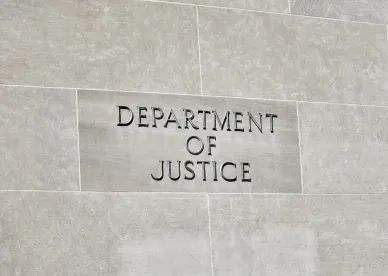The Department of Justice (DOJ) and the Securities and Exchange Commission (SEC) quietly released updated guidance on the Foreign Corrupt Practices Act (FCPA) before the Fourth of July holiday weekend. Entitled A Resource Guide to the U.S. Foreign Corrupt Practices Act, Second Edition[1] (“Guide”), the Guide is the first update to the original document published in November 2012.
Corporate compliance counsel will note that nothing within the Guide comes as a surprise. The Guide is not a new document, but rather an update of well-known principles that takes into account the enforcement actions, caselaw, and government interpretations that have been issued since 2012.
The Guide is one of the more comprehensive compliance guidelines issued by the government, particularly as it now incorporates by reference recently issued policies including the 2017 FCPA Corporate Enforcement Policy , the 2018 Selection of Monitors in Criminal Division Matters, the 2018 Coordination of Corporate Resolution Penalties, and the 2017 Evaluation of Corporate Compliance Programs, as well as the 2019 and 2020 updates to the Evaluation of Corporate Compliance Programs. Intended to provide guidance on the statutory requirements of the FCPA, the Guide continues to address a variety of topics such as what is covered by the FCPA’s anti-bribery and accounting provisions, guiding principles of enforcement, potential consequences for violations, and the different types of resolutions available.
Corporate compliance counsel will note that nothing within the Guide comes as a surprise. The Guide is not a new document, but rather an update of well-known principles that takes into account the enforcement actions, caselaw, and government interpretations that have been issued since 2012. In particular, updates include the:
- Definition of “foreign official;”
- FCPA’s jurisdictional reach;
- “Local law” affirmative defense;
- Mens rea requirement; and
- Statute of limitations for criminal violations of the accounting provisions.
Of note, the Guide acknowledges the decision in United States v. Hoskins,[2] and the Second Circuit’s finding that individuals can be criminally prosecuted for conspiracy to violate the FCPA anti-bribery provisions or aiding and abetting an FCPA anti-bribery violation, only if that individual’s conduct and role fall into one of the specifically enumerated categories expressly listed in the FCPA’s anti-bribery provisions. The Guide, however, notes that the Northern District of Illinois[3] has rejected Hoskins, and further indicates that unlike the FCPA anti-bribery provisions, the accounting provisions apply to “any person,” and therefore are not subject to the Second Circuit’s reasoning in Hoskins. Nevertheless, the hypothetical on “FCPA Jurisdiction” has been updated from the original resource guide to remove references to jurisdictional reach based on conduct outside of the United States under an application of conspiracy law.[4]
Key updates are also found in the Guide’s examples of enforcement actions and declinations. The Guide includes anonymized case studies of actual investigations resulting in declinations, even where there was senior official engagement involving millions of dollars in bribes. In particular, the Guide includes a Compliance Program Case Study which provides helpful transparency into the government’s focus, and the ultimate benefits, of implementing and enforcing a comprehensive risk-based compliance program. The Compliance Program Case Study confirms that even when an organization’s compliance program fails to catch a violation, declinations are still possible where the organization has implemented a “robust compliance program and good faith enforcement of it.”[5]
The key emphasis on effective compliance programs is further emphasized through the addition of another factor to the original ten “Hallmarks of Effective Compliance Programs.” The additional factor is the “Investigation, Analysis, and Remediation of Misconduct,” which the Guide notes is the “truest measure of an effective compliance program” and aligns the Guide with the 2019 and 2020 update to the DOJ’s Evaluation of Corporate Compliance Programs. Advocating for an effective compliance program is a running theme within the vast majority of recent guidance issued by the DOJ, particularly in negotiating resolutions. The Guide is a helpful tool for organizations and provides a comprehensive roadmap to not only designing and implementing appropriate safeguards against foreign bribery, but also in defending the organization’s compliance program should the government open an investigation into violations of the FCPA.
[1] A Resource Guide to the U.S. Foreign Corrupt Practices Act, Second Edition, by the Criminal Division of the U.S. Department of Justice and the Enforcement Division of the U.S. Securities and Exchange Commission, July 2020, available at https://www.justice.gov/criminal-fraud/file/1292051/download.
[2] United States v. Hoskins, 902 F.3d 69, 76-97 (2d Cir. 2018).
[3] United States v. Firtash, 392 F. Supp. 3d 872, 889 (N.D. Ill. 2019).
[4] A Resource Guide to the U.S. Foreign Corrupt Practices Act, Second Edition, pg. 11.
[5] A Resource Guide to the U.S. Foreign Corrupt Practices Act, Second Edition, pg. 68.





 />i
/>i
